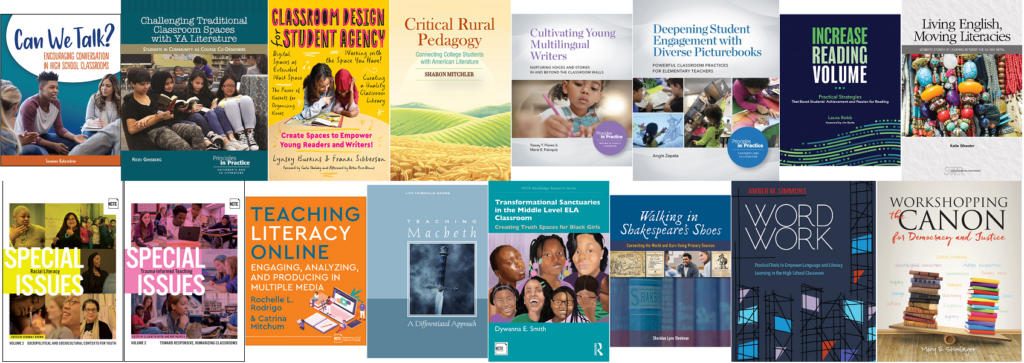In honor of International Women’s Day and Women’s History Month, we’re celebrating recent books from NCTE written or edited by some incredible women.
Can We Talk? Encouraging Conversation in High School Classrooms
Susanne Rubenstein offers strategies and activities that can be easily integrated into an already existing curriculum, allowing students to become not only better speakers, but better writers, better thinkers, and better human beings. (Grades 9–12)
Ricki Ginsberg, along with more than a dozen teacher contributors, shares course design possibilities for teachers seeking to disrupt and reimagine traditional structures with the inclusion of YA literature. Principles in Practice imprint (Grades 9–12)
Classroom Design for Student Agency: Create Spaces to Empower Young Readers and Writers
Lynsey Burkins and Franki Sibberson show how to set up preK–grade 6 classrooms that support student agency, independence, and choice. (Grades PreK–6)
Critical Rural Pedagogy: Connecting College Students with American Literature
Drawing on her experiences in her American literature survey course at Centralia College, a small, rural, community college, Sharon Mitchler argues for a reconfiguration of critical pedagogy to empower and engage American literature students at rural community colleges. (College)
Tracey T. Flores and María E. Fránquiz offer ideas for K–5 educators who are interested in cultivating young writers by designing and facilitating writing instruction that begins with the resources that students bring to the classrooms from their families, homes, and communities. Principles in Practice imprint (Grades K–5)
Featuring diverse picturebooks, Angie Zapata offers practical approaches and guiding principles to explore literature through an anti-oppressive lens in the early childhood and elementary classroom. Principles in Practice imprint (Grades PreK–6)
Laura Robb suggests practical ways to organize instruction so students in ELA classes and across the curriculum read voluminously every day. (Grades 7–12)
Living English, Moving Literacies: Women’s Stories of Learning between the US and Nepal
Katie Silvester demonstrates how researchers and practitioners in writing and rhetoric studies can engage in story work across differences in culture, language, locations, and experience. CCCC Studies in Writing & Rhetoric (SWR) Series (College)
Special Issues, Volume 2: Racial Literacy: Sociopolitical and Sociocultural Contexts for Youth
With this collection of original essays, editor Ayanna F. Brown and her contributors help to push the field of racial literacy into new directions, to avoid niceties and other pitfalls, to get to the heart of racial understanding, to better respond to the needs of our students and society. (Grades K–College)
Special Issues, Volume 2: Trauma-Informed Teaching: Toward Responsive, Humanizing Classrooms
Editors Elizabeth Dutro and Bre Pacheco have edited this collection of original essays with the belief that trauma-informed teaching, with all of the complex layers that term contains, can and must be harnessed to propel movements toward equity and justice in English language arts classrooms. (Grades K–12)
Teaching Literacy Online: Engaging, Analyzing, and Producing in Multiple Media
Rochelle L. Rodrigo and Catrina Mitchum focus on the pedagogy of literacy learning and share guidelines for how to translate that into digital learning environments. (Grades 9–College)
Teaching Macbeth: A Differentiated Approach
Macbeth, a story of ambition, terror, and conscience, speaks to our students and our era. Through differentiated instruction, Lyn Fairchild Hawks offers ways to engage all students with different readiness levels and interests. (Grades 7–12)
Drawing from an arts-based research and humanizing methodologies, Dywanna E. Smith documents transformative and liberatory spaces in ELA middle level classrooms, where students address and counteract discrimination, colorism, sizism, and body shaming. NCTE-Routledge Research Series (Grades 6–9)
Walking in Shakespeare’s Shoes: Connecting His World and Ours Using Primary Sources
Sheridan Lynn Steelman proposes and explores a historical and cultural approach to teaching Shakespeare, situating the plays and sonnets in a tumultuous early modern world. (Grades 7–12)
Word Work: Practical Tools to Empower Language and Literacy Learning in the High School Classroom
Amber M. Simmons explores how students can use linguistic tools to enhance their own reading comprehension and argumentative writing. (Grades 9–12)
Workshopping the Canon for Democracy and Justice
Mary E. Styslinger adopts and adapts foundational reading and writing workshop structures to help middle and secondary teachers more effectively teach democratic concepts and justice in their English language arts classrooms. (Grades 6–12)
Explore these and other titles in the NCTE Store!

